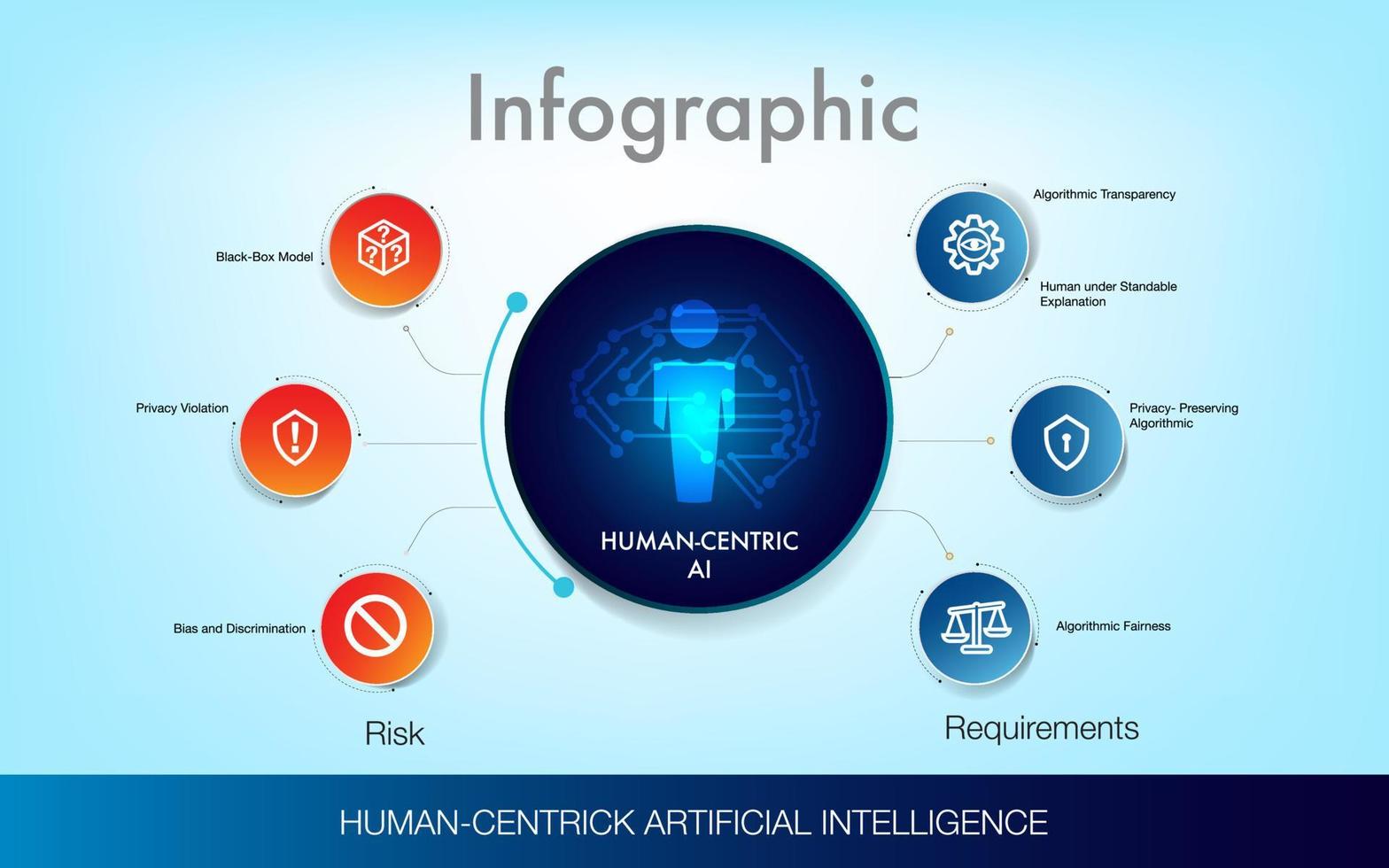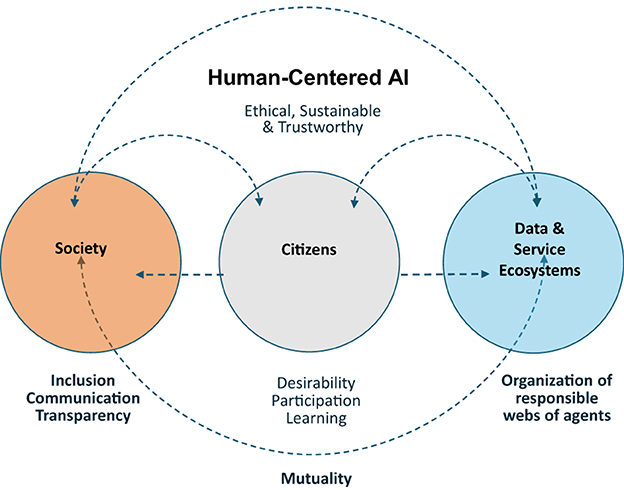Human Centric AI Transformation: Elevating User Experience through Intelligent and Compassionate Solutions
Wiki Article
Human Centric AI as a Stimulant for a More Empathetic and inclusive Society
Over the last few years, the development of expert system (AI) has actually reinvented different markets, making tasks more developing and effective total efficiency. The focus has actually shifted towards human-centric AI, which aims to create systems that focus on inclusivity and compassion. This change has extensive ramifications for society as AI has the prospective to foster an extra comprehensive and empathetic culture. By including human worths and perspectives right into AI systems, we can get rid of biases, promote diversity, and make certain that technology benefits all individuals, no matter their background or capacities. This introduction explores the significance of human-centric AI in improving inclusivity, fostering compassion, and ultimately acting as a driver for a more equitable and harmonious future.The Importance of Human-Centric AI
The significance of human-centric AI exists in its capacity to prioritize the needs and wellness of individuals, fostering a much more empathetic and inclusive culture. Standard AI systems have focused primarily on effectiveness and performance, commonly disregarding the human element (human centric ai). With the introduction of human-centric AI, there is a change towards developing systems that take right into account the special needs and preferences of people.By placing human beings at the leading edge, human-centric AI aims to create technology that is more user-friendly, versatile, and receptive. This method acknowledges that AI needs to be a tool to improve human capacities as opposed to replace them. It looks for to encourage people by offering individualized experiences and services that accommodate their details scenarios.
In addition, human-centric AI advertises inclusivity by making certain that innovation is obtainable to all. It addresses concerns connected to personal privacy, predisposition, and discrimination problems, making AI systems extra fair and fair. By engaging and considering diverse point of views with a vast array of stakeholders, human-centric AI cultivates a more inclusive culture where every person has an opportunity to gain from technological improvements.
Additionally, human-centric AI cultivates empathy by making it possible for makers to understand and react to human emotions, needs, and values. It motivates the advancement of AI systems that can understand, interact, and team up successfully with human beings, resulting in even more significant interactions and partnerships.
Enhancing Addition With AI Technology
Enhancing addition with AI technology entails leveraging its capabilities to equip and resolve obstacles marginalized communities. AI can play an essential function in producing an extra comprehensive culture by giving services to long-lasting difficulties encountered by marginalized teams.AI can likewise aid in supplying easily accessible modern technologies for people with handicaps. With computer system vision and all-natural language processing, AI can allow visually damaged individuals to browse their setting extra independently. Voice recognition modern technology can empower individuals with physical specials needs to connect with digital gadgets making use of voice commands.
Moreover, AI can assist determine and address biases and discrimination. By evaluating large datasets, AI formulas can identify patterns of prejudice and discrimination in different domains, such as work and criminal justice. This information can then be used to develop plans and treatments that advertise equivalent possibilities and reasonable treatment.
Compassion and Understanding in AI Solutions
Dealing with the demand for compassion and understanding in AI systems is vital for promoting an extra empathetic and inclusive culture. As AI becomes increasingly incorporated into our everyday lives, it is essential that these systems are designed to not only perform tasks efficiently yet also to recognize and respond to human emotions and requirements. Empathy in AI systems can allow them to far better serve people with diverse backgrounds, capabilities, and choices, guaranteeing that their one-of-a-kind point of views and demands are thought about.Applying empathy in AI systems includes establishing formulas that can acknowledge and interpret emotional cues from human interactions (human centric ai). This requires training AI versions on huge amounts of data to precisely identify and understand emotions shared via facial expressions, intonation, and body language. Furthermore, AI systems require to be programmed to respond with empathy and compassion, taking into consideration the emotion of the individual and adjusting their responses as necessary
By incorporating compassion and understanding right into AI systems, we can develop innovation that not just assists with tasks but additionally sustains and uplifts individuals. As an example, compassionate AI chatbots can give psychological support and assistance to those experiencing psychological health and wellness difficulties. In addition, compassionate AI can assist bridge interaction voids between individuals with various cultural backgrounds or language obstacles, fostering understanding and compassion across varied areas.
Overcoming Predispositions Through Human-Centric AI
To promote a much more inclusive and compassionate culture, human-centric AI plays a critical duty in conquering predispositions. Predisposition, whether mindful or subconscious, is a prevalent issue that influences decision-making processes in different domain names, consisting of education and learning, employment, and medical care. By leveraging human-centric AI, we can attend to and mitigate these prejudices, making sure fair and fair outcomes for all individuals.
One way that human-centric AI gets rid of predispositions is via explainability. By providing transparent explanations for its decision-making procedures, AI systems can help customers understand and test biases that might exist in the information or formulas. This equips people to make informed choices and take proper actions to combat biases.
Additionally, human-centric AI allows individualized experiences that deal with individual distinctions and choices. By adjusting and recognizing to customers' distinct qualities, AI systems can stay clear of prejudices that might occur from stereotypes or generalizations.
Producing a Much Better Future With AI and Empathy
Human-centric AI, driven by empathy, holds the possible to form a future that is a lot more inclusive and caring - human centric ai. As AI innovations remain to evolve, there is a boosting concentrate on integrating empathy right into their systems. By integrating compassion, AI can better understand and react to human emotions, requirements, and experiences. This has considerable ramifications for different markets, including education and learning, client, and healthcare solution.
In education, AI can assist create an extra inclusive discovering setting. Empathetic AI systems can adjust to private pupils' discovering designs and give customized referrals and comments. This can encourage pupils with different capacities and histories to reach their complete potential.
Moreover, in client service, AI with compassion can improve the total customer experience. By responding and understanding to consumers' feelings, AI can offer more tailored and compassionate assistance, causing greater website link customer contentment and loyalty.
Conclusion
In verdict, human-centric AI has the potential to serve as a driver for a much more compassionate and comprehensive society. By prioritizing the requirements and viewpoints of individuals, AI innovation can enhance addition and conquer predispositions.The emphasis has actually changed in the direction of human-centric AI, which intends to develop systems that prioritize inclusivity and compassion. With the development of human-centric AI, there is a shift towards designing systems that take right into account the distinct needs and choices of people.
Resolving the need for compassion and understanding in AI systems is essential for fostering an extra comprehensive and empathetic culture. Compassion in AI systems can enable them to far better offer people with varied backgrounds, capacities, and choices, making sure that their distinct point of views and demands are taken into consideration.
Human-centric AI, driven by Find Out More empathy, holds the visit site possible to shape a future that is a lot more inclusive and caring.
Report this wiki page